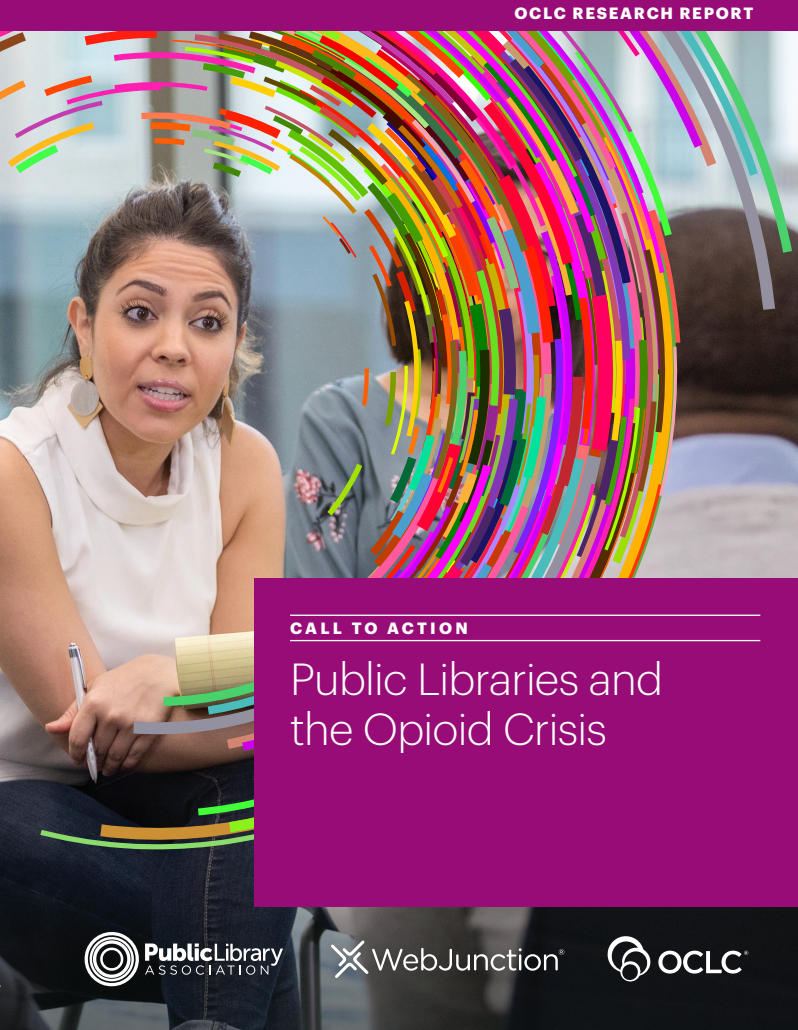OCLC, PLA report offers strategies for public libraries to respond to the opioid crisis
Dublin, OH, — 26 February 2020. OCLC and the Public Library Association (PLA) today issued Call to Action: Public Libraries and the Opioid Crisis, a report that offers tested strategies to consider as libraries determine local responses to the nationwide public health emergency.
According to the Centers for Disease Control and Prevention, 130 people die every day from an opioid overdose. As trusted local institutions, public libraries connect community members to credible, accurate information and services that can help support needs around substance use disorder. The call to action was informed by case study research with eight public libraries that have created community responses with local partners, as well as discussions with government agencies, public health and human services organizations, community organizations, and library leaders.
The call to action encourages public libraries to:
- Evaluate local health data
- Seek community partners
- Educate staff and community members on the issue
- Consider the need for staff care
- Offer programs and services that support local needs
Even in communities where the overdose rate isn’t high, the issues connected to opioids can be challenging. Opioid misuse impacts not only the individual, but also families and friends who may be seeking relevant information and resources.
“This epidemic affects people of every age and in every walk of life. The public health implications are impacting every community in America,” said Skip Prichard, OCLC President and CEO. “As trusted institutions, public libraries are on the front lines of this issue, interacting with people who are looking for answers to important questions. We believe that the findings from this study and strategies outlined in the report will offer insights to help each library and each community address its unique needs.”
The OCLC-led project was supported by a $249,714 National Leadership Grant by the Institute of Museum and Library Services (IMLS, project number LG-00-18-0298-18) to collect and share knowledge and resources that support public libraries and their community partners to address the opioid crisis. The previously released case studies and summary report feature opioid responses from libraries serving populations from 16,000 to more than 800,000 people. Documented activities and programs include training on naloxone use, access to peer navigators, author talks, film screenings, and public awareness campaigns.
“Through these collaborations, public libraries are strengthening our community networks to improve access to relevant resources, increase communities’ awareness and knowledge, and literally save lives,” said PLA President Ramiro Salazar. “This research and call-to-action report provide a range of concrete examples that can be replicated in communities of all sizes.”
The project team conducted eight research-based case studies highlighting varying opioid response efforts across the US, involving the following libraries and community partners:
- Barrington Public Library; Barrington Adult Youth Team (BAY Team) (Rhode Island)
- Blount County Public Library; Blount County Recovery Court (Tennessee)
- Everett Public Library; Snohomish County Human Services (Washington)
- Kalamazoo Public Library; Recovery Institute of Southwest Michigan (Michigan)
- New Orleans Public Library; New Orleans Health Department (Louisiana)
- Peoria Public Library; Human Service Center of Peoria (Illinois)
- Salt Lake County Library; Utah Naloxone; R&R Partners (Utah)
- Twinsburg Public Library; Summit County Community Partnership (Ohio)
PLA and OCLC will discuss the call to action report during the PLA 2020 national conference in Nashville this week. The session, “Partners in the Opioid Crisis: Libraries Strengthening the Community,” will feature representatives from the Blount County (Tennessee) Public Library case study, and will be held Thursday, February 27, 10:15-11:15 a.m., in the Music City Center, Room 205. Press are invited to attend.
K.C. Williams, Director, Blount County Public Library, also will present Recovery and the Library: An Opioid Epidemic Response, at 4 p.m. Wednesday, February 26, at the OCLC Booth #1022 at the Conference.
In addition to the call to action, case studies and summary report, a series of webinars have been offered and are available as recordings. There is also a Facebook group with content and resources for library staff across the country.
About the Institute of Museum and Library Services
The Institute of Museum and Library Services is the primary source of federal support for the nation’s libraries and museums. We advance, support, and empower America’s museums, libraries, and related organizations through grantmaking, research, and policy development. Our vision is a nation where museums and libraries work together to transform the lives of individuals and communities. To learn more, visit www.imls.gov and follow us on Facebook and Twitter.
About the Public Library Association
The Public Library Association (PLA) is the largest association dedicated to supporting the unique and evolving needs of public library professionals. Founded in 1944, PLA serves nearly 10,000 members in public libraries large and small in communities across the United States and Canada, with a growing presence around the world. PLA offers professional development opportunities, unique public library initiatives, and a conference that welcomes public library staff into meaningful partnership. In collaboration with its parent organization, the American Library Association, PLA strives to help its members shape the essential institution of public libraries by serving as an indispensable ally for public library leaders.
About OCLC
OCLC is a nonprofit global library cooperative providing shared technology services, original research and community programs so that libraries can better fuel learning, research and innovation. Through OCLC, member libraries cooperatively produce and maintain WorldCat, the most comprehensive global network of data about library collections and services. Libraries gain efficiencies through OCLC’s WorldShare, a complete set of library management applications and services built on an open, cloud-based platform. It is through collaboration and sharing of the world’s collected knowledge that libraries can help people find answers they need to solve problems. Together as OCLC, member libraries, staff and partners make breakthroughs possible.

